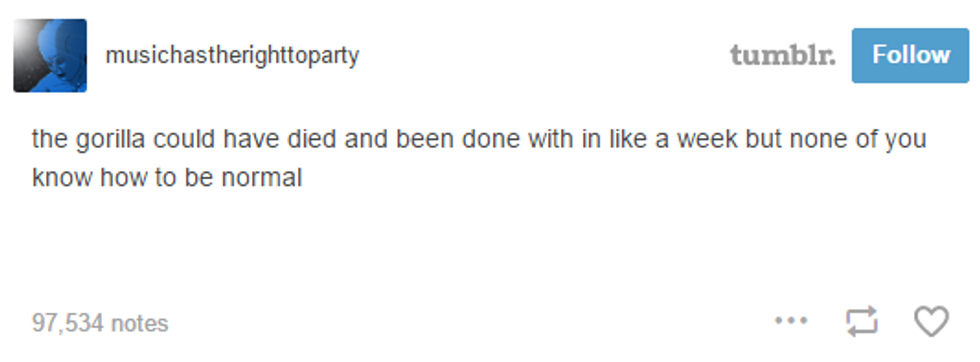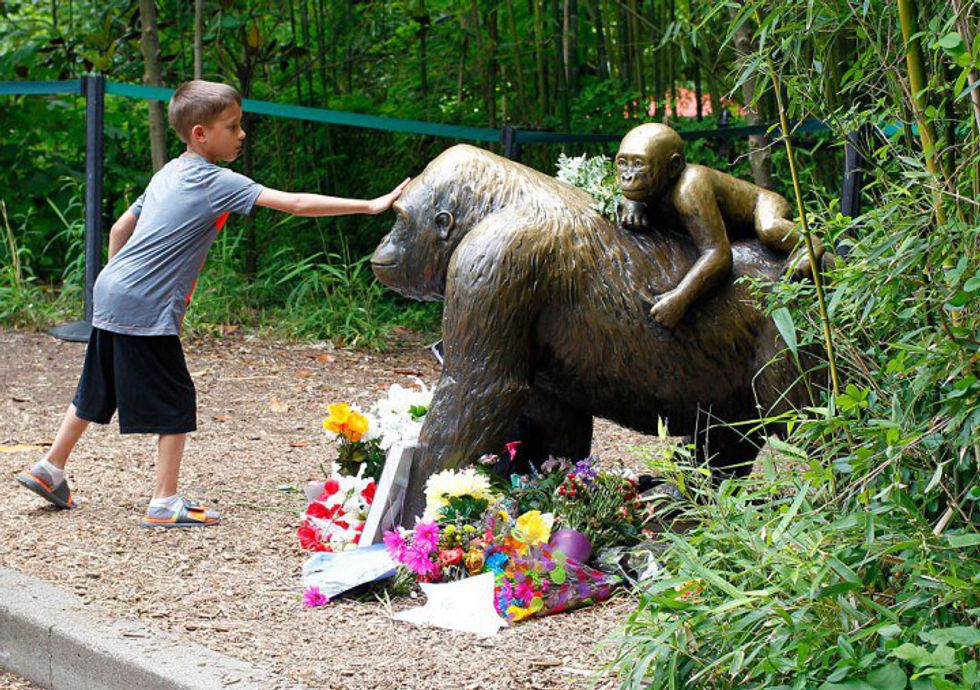I've seen it. You've seen it. Maybe you've even posted about it. The word 'Harambe' has become as prevalent on social media emojis-- in fact, now that I think of it, I'm surprised there isn't a 'Harambe Emoji' yet. In fact, 'Harambe' has even made an appearance in national polls.
So let's do a quick recap: In May of 2016, a young boy named Isaiah Dickerson fell into the gorilla exhibit at the Cincinnati Zoo. The entire event was captured on video, in which the gorilla, names Harambe, can be seen dragging the boy around, picking him up, and standing protectively over him. To say it caused mass chaos and panic is an understatement. Ultimately, in order to protect the life of the boy, zoo officials decided to fatally shoot the gorilla. Then, social media freaking imploded.
Let me take a second to give my opinion on the entire ordeal really fast-- that way you know where I'm coming from with the rest of this article. I absolutely adore animals, and one of my favorite movies growing up was Gorillas in the Mist. I also love King Kong, Planet of the Apes, and anything to do with Koko, the one that learned how to communicate via sign language. But, despite the fact that I think they are fantastic creatures, I believe the zoo made the right call.
The Cincinnati was truly stuck between a rock and a hard place. If they hadn't have shot Harambe, then the boy could have been very seriously injured-- or even killed, in which case we wouldn't be championing a gorilla, but instead a young boy whose life was deemed 'less important' than an animal. IF that had happened, then Harambe would still, likely, have been put down. Is it sad? Absolutely. Was I initially a little upset about it? Of course. And others were, too, justifiably so. It never should have happened, but it did. And it would have been awesome if the world and the zoo could have just moved on after the fact.
If you think of the impact that Harambe has on social media right now, then can you imagine the impact it has on the zoo? A place charged with protecting and serving animals had to kill one of their own, and it's keepers had to say goodbye to a creature that was a significant part of their lives. Imagine your pet dying, you posting about it, and then the entire country not letting go of the fact for months. Think you could move on?
But it didn't just stop there for Cincinnati Zoo. Nope, they have faced an obscene amount of backlash. It got so bad, that they felt the need to address the amount of people targeting them with 'jokes' about the gorilla's death. (Hell, someone even hacked their twitter account and started posting jokes from it. That is a major invasion of privacy.) Let's go back to imagining your pet died, and the world didn't know how to move on from that fact. Now, imagine a few months go by and people have made your dead pet a punchline of some joke, constantly posting memes and tweets-- none of which are in support or respect of your decision.
So the zoo politely issued a statement that they don't find said 'memes' funny. It's short and simple, straight to the point. The reaction? They were blasted, ten-fold. Some could even call it an attack. It was so bad, that the best thing they could do was take down any and all forms of social media.
Those people, who are trying to heal from losing a creature of their own, were being bullied.
For me, that was when it stopped being funny.
Doesn't it sound like another popular (yet horrific) phenomenon of the age of the internet? You know.... trolling? Newsflash: the same people who attack a zoo's social media page for the death of an animal are the same people who think it's okay to mob and abuse Leslie Jones on her twitter page by insinuating that she, being a fierce black woman, is like Harambe.
I know people who share memes and caption Instagrams with something about Harambe the gorilla, and they are not bad people. But I can't help but feel like it contributes to the hateful trolls that use this gorilla's death on social media for their own amusement, by bullying others and by not just letting it die. Don't we think that maybe it's just kind of gone too far?
Other popular 'memes' go viral without causing the same kind of damage. Remember ice-bucket challenge, back in 2014? Somehow, the ALS Association made it 'cool' to dump freezing cold water all over your head-- and it paid off, big time. Unfortunately, a lot of people stopped caring that it was for the ALS Association in the first place and stopped even mentioning it, or posting the link to donate. Instead, it became a social media opportunity. (But you know what, I can't complain. It did a great thing and it definitely encouraged me to donate.)
However, the current 'Harambe' movement has little to do with bringing awareness to the care and treatment of gorillas in captivity. It was MOSTLY started as a way to show how much the liberal media overreacted and to make fun of the 'social justice warriors' who were enraged by the event. Don't even try to tell me that '#DicksOutForHarambe' is meant to be respectful. It's meant to be a joke.
(Sidenote: when did it become a bad thing to fight for social justice? Please, let me know.)
By all means, don't take this as a lecture or an insult. You are free to talk about Harambe in any way you want, and I'm not personally offended by it or anything. But maybe this is just a little food for thought? No need to think deeply about your captions or whatever, but it can't hurt to acknowledge what this 'Harambe' movement was born out of, either.
If you do it to legitimately honor the death of the gorilla, because you care deeply about him and the way creatures are treated in and out of captivity then great! I respect that you are being respectful.
If you are deliberately trying to make a statement about the reaction of the people to the incident and to prove a point that maybe it's a distraction from 'real issues' then great! That's a completely valid opinion, and it's great that you've put some genuine thought behind it.
But if you're just doing it to be 'in on' a joke or because 'it's cool to be ironic'-- well, it's kinda not that funny anymore.





















